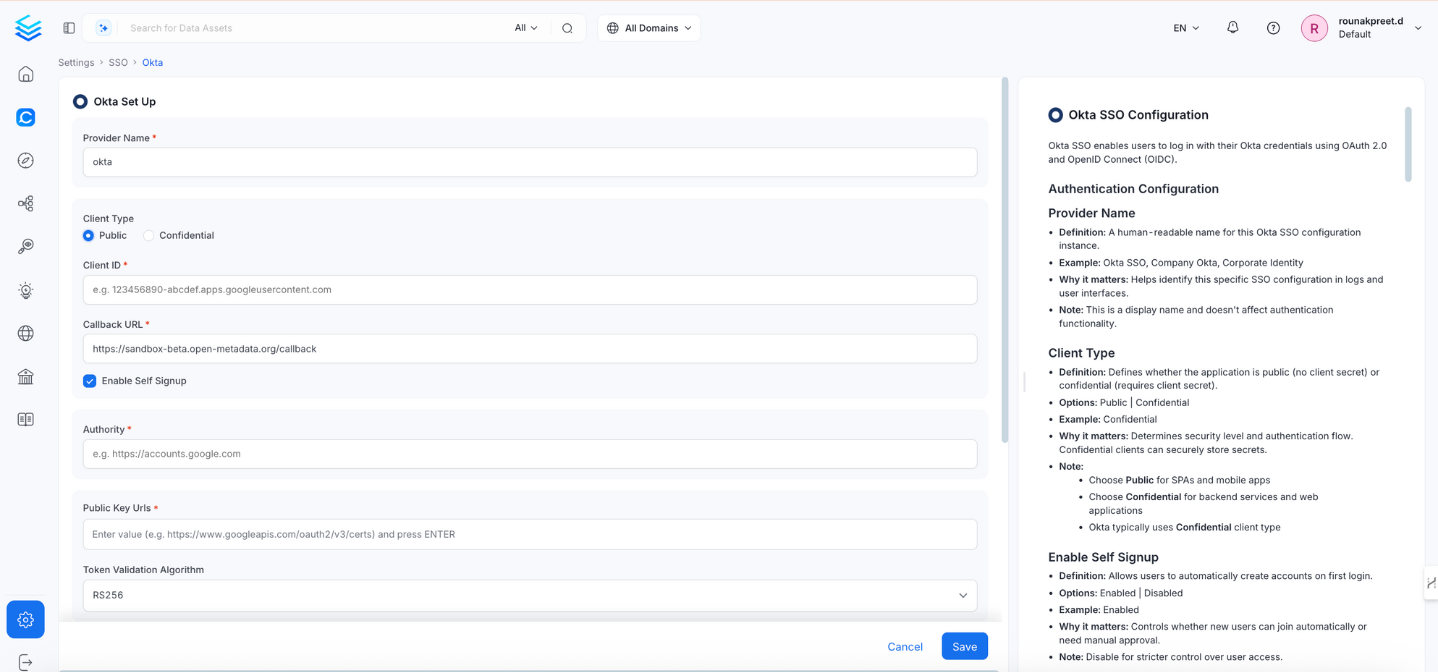Okta SSO Configuration (Public)
Okta Single Sign-On (SSO) enables users to log in to OpenMetadata with their Okta credentials using OAuth 2.0 and OpenID Connect (OIDC).
This guide explains how to configure the Public Client setup for Okta authentication in OpenMetadata.

Provider Name
A human-readable name for this Okta SSO configuration instance.
Example: Okta SSO, Company Okta, Corporate Identity
Why it matters: Helps identify this SSO configuration in logs and the OpenMetadata user interface.
Note: This is a display name and does not impact authentication functionality.
Authentication Configuration (Public)
Client Type
Defines whether the application is public (no client secret) or confidential (requires client secret).
Options: Public | Confidential
Example: Public
Why it matters: Determines the authentication flow and security level.
Note:
- Choose Public for frontend or browser-based applications.
- Choose Confidential for backend services or web apps.
- Okta typically uses Confidential type, but Public is suitable for deployments without a client secret.
Callback URL
Redirect URI where Okta sends authentication responses after successful login.
Example: https://yourapp.company.com/callback
Why it matters: This must exactly match the Sign-in redirect URI configured in your Okta application.
Note:
- Configure under Okta → Applications → Your App → General → Sign-in Redirect URIs.
- Always use HTTPS for production environments.
Enable Self Signup
Allows users to automatically create OpenMetadata accounts on their first login through Okta.
Options: Enabled | Disabled
Example: Enabled
Why it matters: Controls whether new users can self-register or require admin approval.
Note: Disable for stricter user access management policies.
Authority
Specifies the Okta domain responsible for issuing authentication tokens.
Example: https://dev-123456.okta.com or https://company.okta.com
Why it matters: Informs OpenMetadata which Okta tenant to authenticate users against.
Note: Use the complete Okta domain URL (including the https:// prefix).
Public Key URLs
A list of URLs where Okta publishes its public keys used to verify JWT token signatures.
Example: ["https://dev-123456.okta.com/oauth2/v1/keys"]
Why it matters: OpenMetadata uses these keys to validate incoming tokens.
Note: These URLs are typically auto-discovered from the OIDC discovery URI and rarely require manual configuration.
Token Validation Algorithm
Defines the algorithm used to verify the JWT token signatures from Okta.
Options: RS256 | RS384 | RS512
Default: RS256
Example: RS256
Why it matters: Ensures the tokens are validated using the correct signing algorithm.
Note: Okta typically uses RS256.
JWT Principal Claims
Specifies which JWT claims identify the authenticated user.
Example: ["preferred_username", "email", "sub"]
Why it matters: Determines how OpenMetadata identifies unique users during authentication.
Note: Common Okta claims include email, preferred_username, sub, and login.
JWT Principal Claims Mapping
Maps JWT claims from Okta to OpenMetadata user attributes.
Example: ["email:email", "name:name", "firstName:given_name"]
Why it matters: Controls how user data from Okta is represented in OpenMetadata profiles.
Note: Use the format "openmetadata_field:jwt_claim" (e.g., email:email).
Admin Principals
Specifies a list of user principals who have administrative privileges in OpenMetadata.
Example: ["admin@company.com", "superuser@company.com"]
Why it matters: Grants full platform access to designated users.
Note: Ensure these match the email or preferred_username values from Okta tokens.
Principal Domain
Defines the default domain used when constructing user principal names.
Example: company.com
Why it matters: Helps form complete usernames if only local parts (before @) are provided.
Note: Typically corresponds to your organization’s primary domain.
Enforce Principal Domain
Indicates whether all users must belong to the defined Principal Domain.
Default: false
Example: true
Why it matters: Adds a layer of security by ensuring only users from approved domains can log in.
Note: Useful for multi-tenant Okta setups where access should be limited to a specific organization.
Enable Secure Socket Connection
Determines whether to use SSL/TLS for secure communication between OpenMetadata and Okta.
Default: false
Example: true
Why it matters: Ensures encrypted data exchange during authentication.
Note: This setting should always be enabled in production environments.
Summary
| Field | Example / Default |
|---|---|
| Client Type | Public |
| Callback URL | https://yourapp.company.com/callback |
| Authority | https://dev-123456.okta.com |
| Public Key URLs | https://dev-123456.okta.com/oauth2/v1/keys |
| Token Validation Algorithm | RS256 |
| JWT Principal Claims | ["preferred_username", "email", "sub"] |
| JWT Mapping | ["email:email", "name:name", "firstName:given_name"] |
| Admin Principals | ["admin@company.com"] |
| Principal Domain | company.com |
| Enforce Principal Domain | false |
| SSL/TLS | true |
Troubleshooting
If users are automatically logged out and unable to log in again due to a bad authentication configuration, you can reset the security setup using the following command:
After executing the command, restart the server. The authentication values from your YAML or Helm chart will then be reapplied on startup. The following tiles detail how to apply this configuration across Docker, Kubernetes, and Bare Metal deployments: